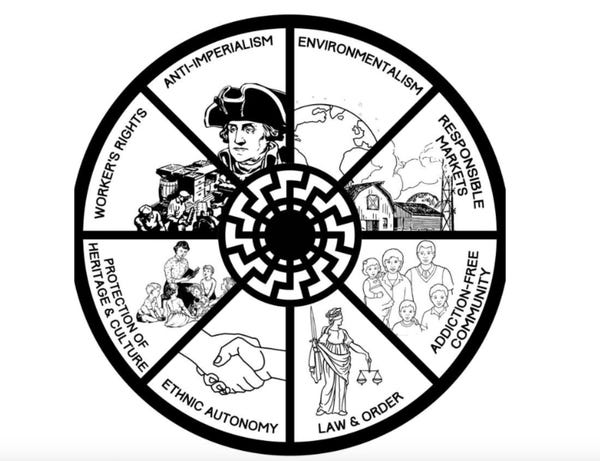WHITE FRAGILITY: THE GREAT REPLACEMENT CONSPIRACY THEORY
What is the theory?
The “great replacement” is a white supremacist conspiracy theory that warns of impending white genocide, in the absence of action.
It is a conspiracy theory said to have originated with Renaud Camus, a French writer: “The great replacement is very simple,” Mr. Camus has said. “You have one people, and in the space of a generation you have a different people.”
14 Words
“14 Words” is a reference to the most popular white supremacist slogan in the world: “We must secure the existence of our people and a future for white children.”
The slogan was coined by David Lane, a member of the white supremacist terrorist group known as The Order (Lane died in prison in 2007). The term reflects the primary white supremacist worldview in the late 20th and early 21st centuries: that unless immediate action is taken, the white race is doomed to extinction by an alleged “rising tide of color” purportedly controlled and manipulated by Jews.

Because of its widespread popularity, white supremacists reference this slogan constantly, in its full form as well as in abbreviated versions such as “14 Words”, “Fourteen Words,” or simply the number “14.”
The Global reach of the conspiracy theory – research by Julia Ebner & Jacob Davey
The so-called ‘Great Replacement’ theory originated in France and its main proponents include the Identitarian group Generation Identity, an organisation that wants to preserve ‘ethnocultural identity’ globally.Our 2019 Generation Identity Europe Census identified 70,000 followers of official GI accounts on Twitter, 11,000 members of Facebook groups, 30,000 members of Telegram groups and 140,000 subscribers on YouTube. Although these numbers will inevitably contain researchers and journalists, our assessment suggests that a majority of these individuals are supporters of the Identitarian Movement.
We identified around 1.5 million tweets referencing the Great Replacement theory between April 2012 and April 2019 in English, French and German language. The volume of tweets steadily increased in the seven years leading up to the Christchurch attack, with the number of tweets mentioning the theory nearly tripling in four years from just over 120,000 in 2014 to just over 330,000 in 2018.
French accounts dominate online conversation around the Great Replacement theory, perhaps unsurprisingly as the concept originated in France. However, the theory is becoming more prevalent internationally with English speaking countries accounting for 32.76% of online discussion around it.
Extreme-right communities use a range of methods to broadcast the Great Replacement theory, including dehumanising racist memes, distorting and misrepresenting demographic data, and using debunked science. Great Replacement propagandists have found ways to co-opt the grievances of different fringe communities on the internet by connecting anti-migration, anti-lesbian, gay, bisexual and transgender (LGBT), anti-abortion and anti-establishment narratives.
The Great Replacement theory is able to inspire calls for extreme action from its adherents, ranging from non-violent ethnic cleansing through ‘remigration’ to genocide. This is in part because the theory is able to inspire a sense of urgency by calling on crisis narratives.
We found over 540,000 tweets using the term ‘remigration’ between April 2012 and April 2019.
This concept calls for forced deportations of minority communities and essentially represents a soft form of ethnic cleansing.
Since 2014, the volume of tweets about remigration has surged and reached broader audiences, rising from 66,000 tweets in 2014 to 150,000 tweets in 2018. The first stark increase in conversation around the theory occurred in November 2014, coinciding with the first Assises de la Remigration (Annual Meetingon Remigration) organised by Generation Identity in Paris.
Politicians and political commentators have been key in mainstreaming the Great Replacement narrative by making explicit and implicit references to the conspiracy theory in their speeches, social media posts and policies. We identified four leading politicians from across Europe explicitly advocating the Great Replacement concept, and five others using related language and conspiracy theories in their campaigns.
Alternative far-right media outlets have played an important role in spreading the idea of remigration on a global level in the last year: 10 out of the top 15 sources are responsible for roughly 50% of total coverage of the term remigration between April 2018 and April 2019, and can be classified as sources of far-right alternative news.




